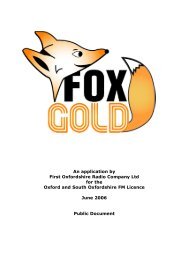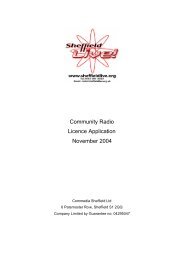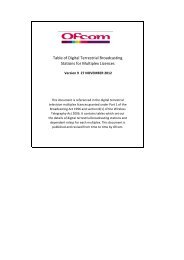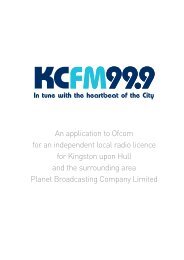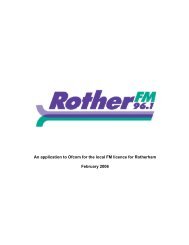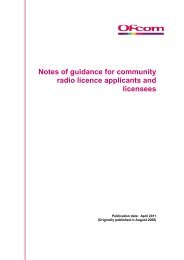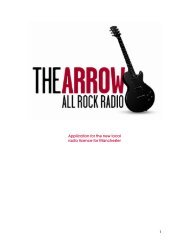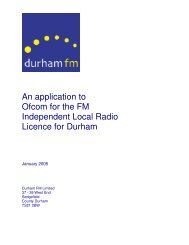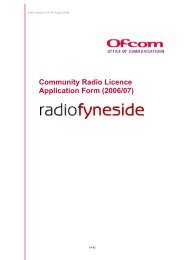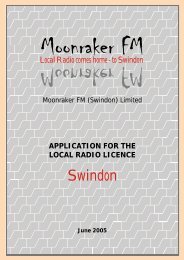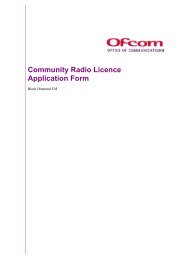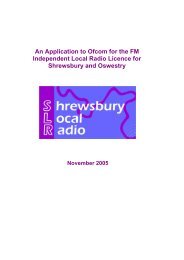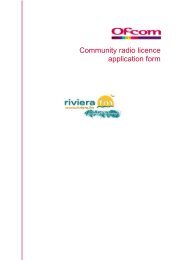Radio Plymouth - Ofcom Licensing
Radio Plymouth - Ofcom Licensing
Radio Plymouth - Ofcom Licensing
You also want an ePaper? Increase the reach of your titles
YUMPU automatically turns print PDFs into web optimized ePapers that Google loves.
RADIO PLYMOUTH<br />
With a breakfast show on BBC local radio that is also light on music, a new station has a clear<br />
market opportunity to get the day off to a better start for <strong>Plymouth</strong>’s listeners and then to hold onto<br />
the audience with more clearly-defined programmes, professionally presented.<br />
There was a perception that other stations, with their anonymous presentation, have an amorphous<br />
mass of output. You rarely know where one programme ends and the other begins.<br />
There was clear evidence of demand for a station that provided more local and accurate information<br />
than is currently available. <strong>Plymouth</strong> Sound’s news and information content was perceived to be<br />
“short and sweet” but lacking in detail and, often in programmes, is no more than a presenter<br />
reading something out of the local paper.<br />
Participants believed that much is going on in <strong>Plymouth</strong> that they simply don’t hear enough about on<br />
local commercial radio. Those who had defected to Pirate FM received little <strong>Plymouth</strong> news either.<br />
They wanted to celebrate events like Music of the Night and the British Firework Championships<br />
and also to hear more about local sports teams. Certainly more than they heard on commercial<br />
radio, but not as much as they would get on BBC <strong>Radio</strong> Devon. There was some feeling that<br />
<strong>Plymouth</strong>, a city rich in sports events, if largely lacking in national success, is underserved by<br />
broadcast media. Again, Pirate FM beats <strong>Plymouth</strong> Sound, but the geography is all wrong: “Local<br />
sports coverage is awful, and Pirate now is very Cornish; it used to be Cornwall and West Devon,<br />
but now there’s very little local <strong>Plymouth</strong> impact” (man, B, 34).<br />
“At the weekend, you want half-time reports and full-time results, at least,” summed up one<br />
respondent (male, C1, thirties).<br />
Conclusions for <strong>Radio</strong> <strong>Plymouth</strong><br />
<strong>Radio</strong> <strong>Plymouth</strong>’s programmes will be presented by bright professional broadcasters that listeners<br />
will come to know, and in some cases who they know well already.<br />
News and information is central to our programme plans. We will employ experienced journalists<br />
and commit to ongoing training of news and production staff.<br />
Presenters<br />
Some local radio presenters were considered to be “childish”, “amateur” and “anonymous”, with few<br />
names that listeners can recall: “they are just club DJs or <strong>Radio</strong> 1 wannabes” (male, B, 34).<br />
This is a change from the early days of <strong>Plymouth</strong> Sound, when our respondents could recall the<br />
names of local presenters. Now they can’t – “and I was listening this morning!” Given that <strong>Plymouth</strong><br />
Sound achieves the highest weekly reach, satisfaction in our target audience appears to be low and<br />
this supports our contention that some listening is by default.<br />
56



